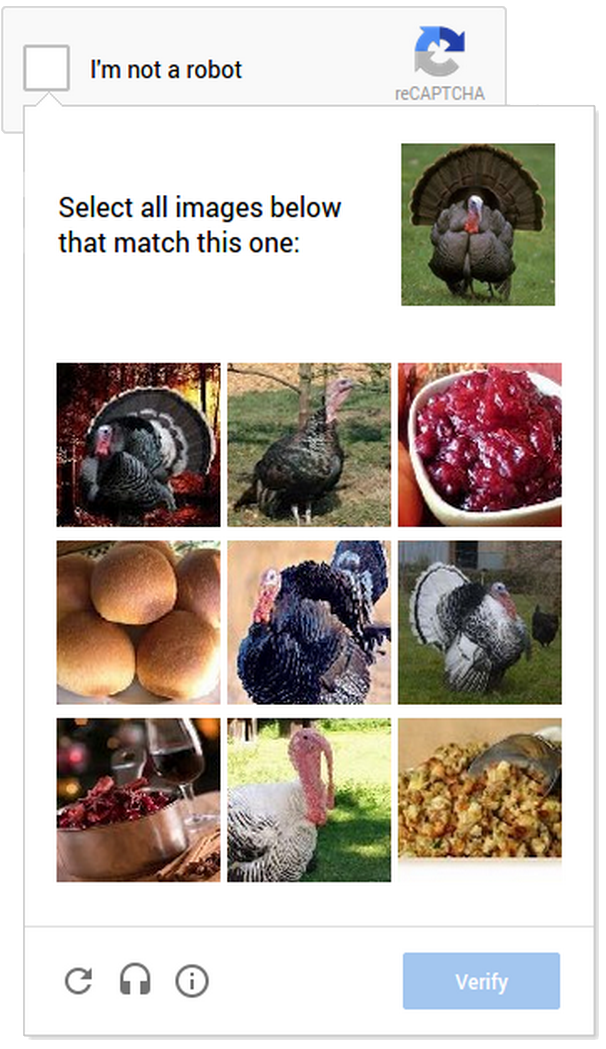Google Upgrades Security From 'reCAPTCHA' to 'No CAPTCHA reCAPTCHA'
One of the most frequent questions on the Internet is "Are you a robot?" followed by a text field where you type a word or two to prove that you are in fact human. These reCAPTCHA security checkpoints are used on many sites to prevent automated spam bots from accessing and damaging sensitive data. Today, Google announced a quicker and more secure form of reCAPTCHA called "No CAPTCHA reCAPTCHA."
No CAPTCHA reCAPTCHA can easily determine if a user is human, and it only requires a simple check mark instead of the need to type words or a series of letters. If the API can't determine if the user is human, the old text CAPTCHA is created along with the check mark to verify the user.
The new CAPTCHA will also work on mobile devices. Instead of typing words as an additional security measure, images will appear. For example, the user has to match corresponding images to the original image for verification.
The creation of a new CAPTCHA system is a result of Google's test to see if machines were able to read the distorted text. The terrifying conclusion was that today's advanced artificial intelligence was able to solve the challenge with an accuracy of 99.8 percent.
As a result, Google used an Advanced Risk Analysis program, which gathered data on a user's actions before, during and after using a reCAPTCHA in order to differentiate between human and automated users. This eventually evolved into No CAPTCHA reCAPTCHA.
So far, only a few websites have adopted the new system, but these include Snapchat, Wordpress, and Humble Bundle, and the results seem to show that No CAPTCHA reCAPTCHA is working. According to the announcement blog post, over 80 percent of Humble Bundle's traffic and 60 percent of Wordpress' traffic encountered No CAPTCHA security.
Even with a new CAPTCHA API, the old version isn't going anywhere. Sites that are a bit skeptical of the new API don't have to upgrade and can choose to stick with the current version.
Get Tom's Hardware's best news and in-depth reviews, straight to your inbox.
Follow us @tomshardware, on Facebook and on Google+.
Seth Colaner previously served as News Director at Tom's Hardware. He covered technology news, focusing on keyboards, virtual reality, and wearables.
-
dgingeri Oh, great, now they've gone and created an initiative for spammers to make bots that can determine and compare images. You know what this means? The near worst of humanity is now working on advancement of AI. Skynet is sure to develop from this. They'll kill us all.Reply -
Anton Taylor The problem with this is that Google already has an engine that can defeat this (and has done for many years), how long will it be before someone gets a bot to "learn" from google's engine, and then uses googles own tech to defeat this?Reply -
randomizer This sort of thing has been around for years. There are already services to defeat it. Why write an algorithm to work it out when you can pay sweatshop workers $1 to solve hundreds of these?Reply -
NoMoreCaptchas This CAPTCHA technology is wasting everyones time and irritates people up until http://NoMoreCaptchas.com which is passive user authentication. This technology is completely passive and detects and authenticates human vs bot and bot vs bot. This is the future of the internet with more human interaction.Reply -
Christopher1 Does it need Javascript? If so, non-starter for many people like myself who pro-actively filter Javascript from all but a few sources.Reply -
Haravikk 99.8%? That's got to be much higher than the pass rate for humans! I myself make mistakes at least a quarter of the time.Reply

